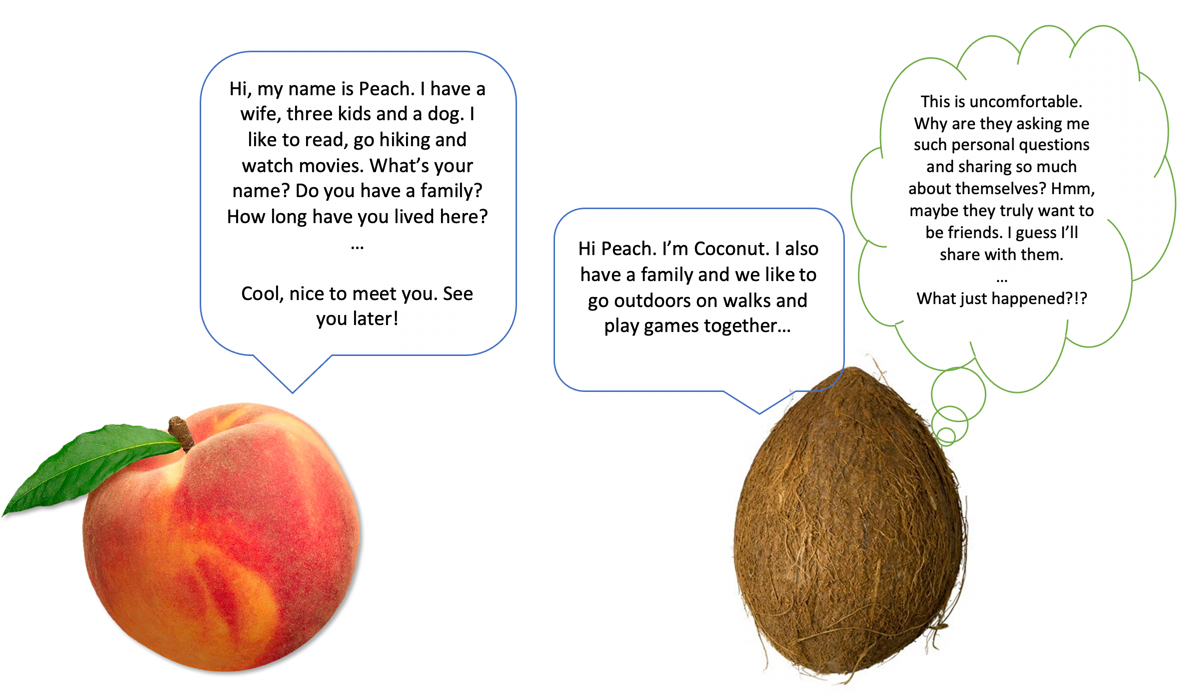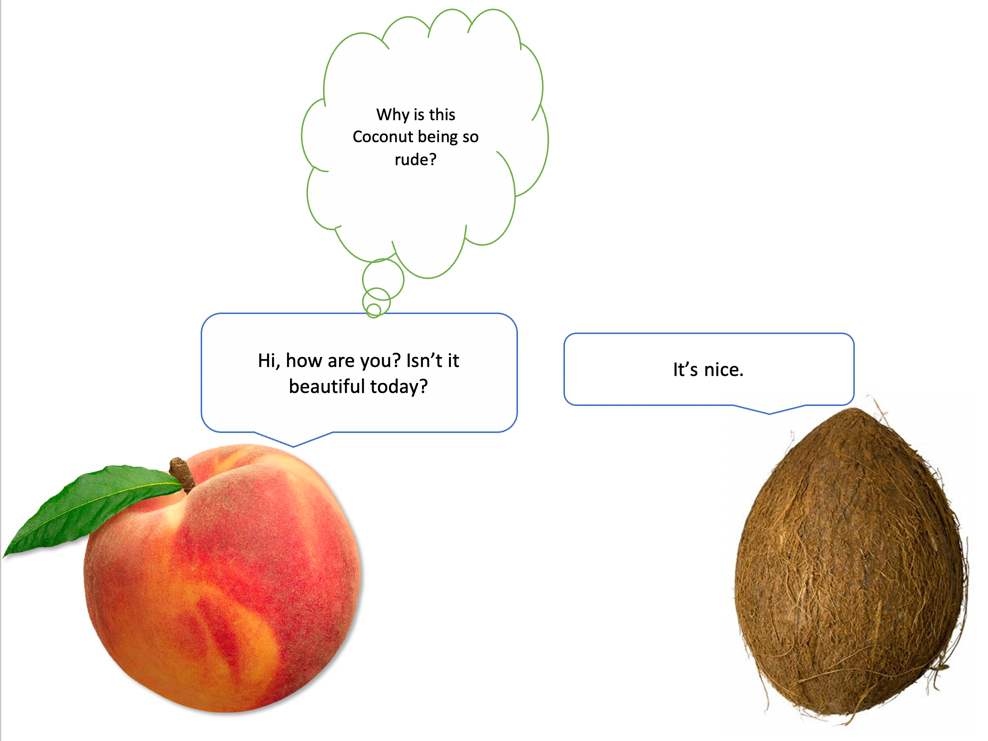Today, I’m going to continue my Growing Your Cultural Awareness in Business series, drawing on learnings from Erin Meyer’s The Culture Map. This post is the sixth in an eight-part series and will focus on the Trust scale in the Culture Map (task-based vs. relationship-based).
Cognitive Trust & Affective Trust
Before we dive into the trust scale, it’s worth quickly touching on the difference between cognitive & affective trust, as these impact our understanding of the trust scale:
Cognitive Trust:
- Trust is based on the confidence you feel in another person’s accomplishments, skills & reliability.
- Trust comes from the head.
Affective Trust:
- Comes from feelings of emotional closeness, empathy or friendship.
- Trust comes from the heart.
The Trust Scale: Task-based vs. Relationship-based Trust
Now let’s look at the high-level differences between the two ends of the trust spectrum:
Task-based Trust:
- Trust is built through business-related activities.
- Work relationships are built and dropped easily, based on the practicality of the situation.
- General mentality = “You do good work consistently, you are reliable, I enjoy working with you … I trust you.”
Relationship-based Trust:
- Trust is built through sharing meals, evening drinks & visits at the coffee/tea station.
- Work relationships build slowly over the long term.
- General mentality = “I’ve seen who you are at a deep level, I’ve shared personal time with you, I know others well who trust you … I trust you.”
The Relationship between Cognitive/Affective Trust & Task-based/Relationship-based Trust
Generally speaking…
- The further a culture falls toward the task-based end of the scale, the more people from that culture tend to separate affective & cognitive trust (“business is business”…leave personal life out of it).
- The further a culture falls toward the relationship-based end of the scale, the more cognitive and affective trust are woven together in business (“business is personal… i.e. you can’t do business without a relationship).
SPS Offices on the Trust Scale

Task-Based <———————————————————–> Relationship-Based
Note: Countries represented: AU = Australia, US = United States, UA = Ukraine, , IN = India, . These are the locations that I work most closely with, though we have team members in other global locations as well.
Americans & Task-based Work Relationships
Since many of the readers of this blog likely fall within the United States, and the US is the MOST task-based nation on the trust scale, I should probably answer this potential question: “What about breakfast/lunch meetings, team outings, icebreaker exercises, etc?… Aren’t we relationship-based here in America?”
No. Or at least, not really (or rather, not within work). Consider the icebreaker exercise for example: The goal of the ice breaker? .. help relative strangers get to know something about one another so they feel comfortable talking to one another…SO THAT they can get down to business and work on whatever project, issue, etc they are faced with. Additionally, while the ice breaker can help us build relationships in a relatively short time, Americans drop those newly formed relationships just as quickly (our job here is done… see you later…). Icebreaker activities are actually uncommon in relationship-based cultures (this makes sense if you think about it - they build relationships slowly, over time, with multiple interactions).
Another way to think about this is via the helpful analogy of peach vs. coconut cultures. For more info on this, check out this article My synopsis: Peaches are quick to share a lot of information (they have a soft ‘shell’) but when it gets to the real deep stuff, they have a solid ‘pit’ that can block them from letting people ‘all the way in’; In contrast, Coconuts have a tough exterior and it thus takes some more work to get into personal things, but once you’re in, you’re in … My takeaway for Americans specifically is that: just because Americans are friendly (which we are..especially in MN), it doesn’t mean we’re relationship-based. It just means we’re peaches :)
Because I find the peaches & coconuts analogy to be particularly helpful, I’m going to continue to use this analogy for my examples below:
How Confusion Arises & How to Deal With It
Peaches → Coconuts

It can seem strange to “Coconuts” that “Peaches” would so willingly share personal information about themselves and ask what are very personal questions in a Coconut culture.
- If you’re a peach, be aware of whether or not you’re talking to a peach or a coconut, and how your everyday questions might be perceived as personal. If working with a coconut, spend some time getting to know them in a non-work setting and you’ll find that Coconuts are more than happy to open up once they know you on a personal level.
It can also seem very disingenuous when a Peach has such a personal conversation with a Coconut and then they leave the conversation without any sort of indication that they intend to see or talk to the Coconut again.
- This is very normal for Peaches, it’s nothing personal. If a Peach “overshares” with you, it’s not their way of asking for a deep relationship and they’re not trying to mask some sort of hidden agenda. It’s just a cultural norm for a Peach to act in this way.
Finally, it can be very bizarre for a Coconut to have a Peach be so open about so many things and then run into their “pit” and be blocked off from actually getting to know who the Peach is at a deeper/more real level.
- Again, fellow Peaches, remember that Coconuts are relationship-based. If you are willing to share big parts about your life (about your family, what you did on the weekend, etc), don’t be afraid to share more personal information (see below for more).
Coconuts → Peaches

It can be offputting to Peaches when they attempt to be friendly with a Coconut and receive a “flat” response in return (or something that is not perceived as being equally friendly).
- Coconuts, your Peach co-workers aren’t weirdos. We are just trying to get to know you in our own way.
- Peaches, your Coconut co-workers aren’t snobbish, arrogant, or angry with you. This is just weird for them.
Peaches: Be yourself; smile as much as you want, share as much as you want, but don’t expect Coconuts to do the same & don’t ask personal questions until you’ve gotten to know the Coconut on a more personal level (& remember, this takes time and non-work interactions and activities).
Strategies for Success
Working with Task-Based Cultures:
- Don’t throw out the socializing altogether. Task-based peers also enjoy socializing, meals, outings. However, if it is going to be a “long lunch” (over an hour long), tell them about it in advance.
- If you invite a task-based colleague out for drinks after work, and they decline so that they can go back to the hotel and rest or catch up on emails, don’t take offense .. this is a normal and an acceptable response in task-based cultures.
- For communication: Choose the method that is the most efficient - email, chat, video conferencing, etc are all acceptable as long as the message is communicated clearly and succinctly.
Working with Relationship-Based Cultures:
- Be willing to share your personal/non-work self (it’s OK to “let loose” and have a few drinks, or go out for karaoke and sing your little heart out). You don’t always have to be “professional.” This can be misconstrued as uncaring, not having fun, disrespectful, etc
- Act as if you’re out on the town with your best friend.
- Don’t worry about saying or doing the wrong thing. Just be yourself - your personal self, not your business-self.
- Put more time & thought into organizing meals or other events to create moments/memories together.
- Don’t think of “long lunches” or long coffee breaks as a “waste of time” → You’re investing in your relationship which will pay dividends for how you work with the person/people for a long time.
- For communication: Choose a communication medium that is as relationship-based as possible (instead of email → chat; instead of chat → video conference; etc)
Working on a Global Team with a Mix Cultures:
Invest in building up your affective trust → it’s worth the investment.
Build on common interests:
- “You like music? Me too…what are some artists you enjoy?”
- “Yeah, I have kids too. It can be challenging, but it’s amazing.”
If it’s hard for you to find common interests… look harder for them; they’re there :)
NOTE: When working on multi-cultural teams, it is always OK and appropriate to define ‘what is normal’ for your team up-front so that there is no misunderstanding across offices.
Some of this content is either directly taken from, or is a summary of, Chapter 6 of The Culture Map, with my own examples and perspective added for clarity.
Want to Read More?
Curious to read more? Check out my other articles:
- The Benefits of Global Diversification
- Communicating Effectively Across Cultures
- Providing (Negative) Feedback Across Cultures
- Persuasion & Reasoning.
- Leading Across Cultures
- Decision-Making Across Cultures
I’ll also be authoring articles on the remaining two scales of the Culture Map in the coming months, so keep your eyes out for those too!